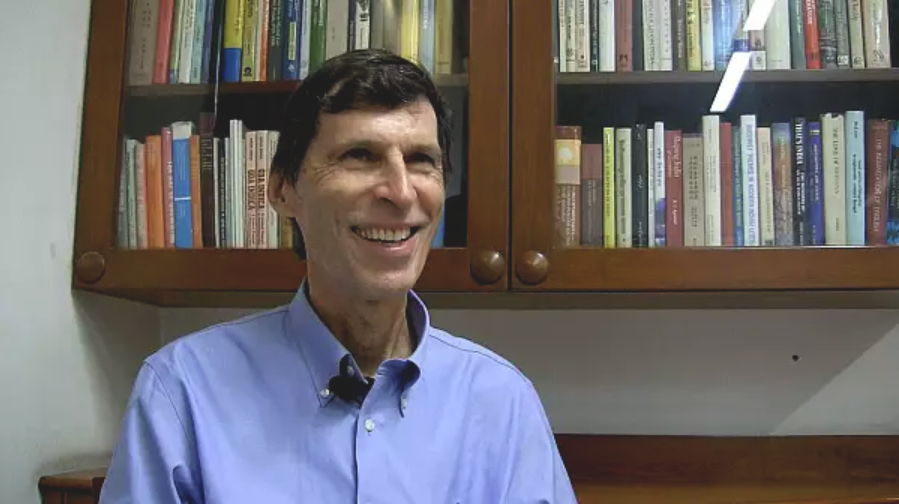Philip Lutgendorf | Ending with a Crow: Bhushundi in the Rāmcaritmānas of Tulsidas
The Institute for South Asia Studies (ISAS) at UC Berkeley in collaboration with the Vedanta Society Berkeley (VSB) are proud to announce the 3rd ISAS-VSB Lecture on Religion in the Modern World by Prof. Philip Lutgendorf, Professor of Hindi and Modern Indian Studies at the University of Iowa.
Event moderated by Robert P. Goldman, Professor of the Graduate School and Catherine and William L. Magistretti Distinguished Professor of Sanskrit Emeritus.
Abstract
The poet-saint Tulsidas’s immensely popular retelling of the Ramayana saga, Rāmcaritmānas (ca. 1574 AD), is structured as an allegorical Himalayan sacred lake symmetrically bounded by four seven-tiered ghats. Each ghat represents the “viewpoint” or darśana of a narrator who regularly appears within the text, expounding to an eager listener who sometimes interrupts to ask questions. This multivocality seems to celebrate that of the Ramayana tradition even as it anticipates the ongoing performance and reinterpretation of the Mānas itself. The narrators (in order of appearance) are the human author Tulsidas, the Vedic sage Yajnavalkya, the god Shiva, and a crow named Bhushuṇḍi. Whereas the first three are either human or (in Shiva’s case) divine-anthropomorphic, the final one (who takes center stage for more than half of the final sub-book, which includes his own lengthy autobiography) is in avian form—and he is not just any bird, but one traditionally regarded in Hindu lore as impure and inauspicious.
Why did the poet choose this unusual figure to conclude his epic narrative and to deliver, in effect, the “last word” on such key Rāmcaritmānas themes as social order, devotional egalitarianism, and the relative merits of nirguṇa (formless) and saguṇa (embodied) understandings of God? On what precursor traditions did Tulsidas draw, and to what extent did he innovate? And how has the quirky persona of Bhushuṇḍi engaged later audiences, including scholarly exegetes and visual artists?
About the Speaker
Philip Lutgendorf taught Hindi and Modern Indian Studies in the Department of Asian and Slavic Languages and Literature for 33 years, retiring in 2018. His book on the performance of the Hindi Ramayana, The Life of a Text (University of California Press, 1991) won the A. K. Coomaraswamy Prize of the Association for Asian Studies. He received a Guggenheim Fellowship in 2002-03 for his research on the popular Hindu deity Hanuman, which appeared as Hanuman’s Tale, The Messages of a Divine Monkey (Oxford University Press, 2007). His interests include epic performance traditions, folklore and popular culture, and mass media. He created a website devoted to Indian popular cinema, a.k.a. “Bollywood” (http://www.uiowa.edu/indiancinema/ ). His research on the cultural history of tea drinking in India was supported by a Fulbright-Hays Senior Overseas Research Fellowship (2010-11). He is presently translating the Ramcharitmanas of Tulsidas as The Epic of Ram, in seven dual-language volumes, for the Murty Classical Library of India/Harvard University Press (http://www.murtylibrary.com/volumes.php ). He served as President of the American Institute of Indian Studies from 2010-2018, and continues serving as Chair of its Board of Trustees (http://www.indiastudies.org/ ).
About the Lecture Series
The ISAS-VSB Lecture on Religion in the Modern World is an annual lecture series that seeks to invite distinguished scholars of world religions to campus with the aim of improving and diversifying conversations about the role of religion in modern societies. Our first lecture in this series was delivered by Prof. Robert A. F. Thurman, a recognized worldwide authority on religion and spirituality, Asian history, world philosophy, Buddhist science, Indo-Tibetan Buddhism, and H.H. Dalai Lama. Click HERE to read more about the series and to listen to recordings of past lectures.
Sponsors
Presented by the Institute for South Asia Studies in collaboration with the Vedanta Society Berkeley. Co-sponsored by the Center on Contemporary India and the Berkeley Center for the Study of Religion.
Admission Information
If you require an accommodation for effective communication (ASL interpreting/CART captioning, alternative media formats, etc.) or information about campus mobility access features in order to fully participate in this event, please contact Puneeta Kala at pkala@berkeley.edu with as much advance notice as possible and at least 7-10 days in advance of the event.

